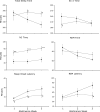Normalizing effects of modafinil on sleep in chronic cocaine users
- PMID: 20080983
- PMCID: PMC5857958
- DOI: 10.1176/appi.ajp.2009.09050613
Normalizing effects of modafinil on sleep in chronic cocaine users
Abstract
Objective: The purpose of the present study was to determine the effect of morning-dosed modafinil on sleep and daytime sleepiness in chronic cocaine users.
Method: Twenty cocaine-dependent participants were randomly assigned to receive modafinil, 400 mg (N=10), or placebo (N=10) every morning at 7:30 a.m. for 16 days in an inpatient, double-blind randomized trial. Participants underwent polysomnographic sleep recordings on days 1 to 3, 7 to 9, and 14 to 16 (first, second, and third weeks of abstinence). The Multiple Sleep Latency Test was performed at 11:30 a.m., 2:00 p.m., and 4:30 p.m. on days 2, 8, and 15. For comparison of sleep architecture variables, 12 healthy comparison participants underwent a single night of experimental polysomnography that followed 1 night of accommodation polysomnography.
Results: Progressive abstinence from cocaine was associated with worsening of all measured polysomnographic sleep outcomes. Compared with placebo, modafinil decreased nighttime sleep latency and increased slow-wave sleep time in cocaine-dependent participants. The effect of modafinil interacted with the abstinence week and was associated with longer total sleep time and shorter REM sleep latency in the third week of abstinence. Comparison of slow-wave sleep time, total sleep time, and sleep latency in cocaine-dependent and healthy participants revealed a normalizing effect of modafinil in cocaine-dependent participants. Modafinil was associated with increased daytime sleep latency, as measured by the Multiple Sleep Latency Test, and a nearly significant decrease in subjective daytime sleepiness.
Conclusions: Morning-dosed modafinil promotes nocturnal sleep, normalizes sleep architecture, and decreases daytime sleepiness in abstinent cocaine users. These effects may be relevant in the treatment of cocaine dependence.
Conflict of interest statement
The authors have no conflicts of interest to disclose.
Figures



Comment in
-
Normalizing effects of modafinil on cocaine-induced sleep abnormalities.Am J Psychiatry. 2010 Mar;167(3):248-9. doi: 10.1176/appi.ajp.2009.09111613. Am J Psychiatry. 2010. PMID: 20194486 No abstract available.
Similar articles
-
Modafinil and sleep architecture in an inpatient-outpatient treatment study of cocaine dependence.Drug Alcohol Depend. 2016 Mar 1;160:49-56. doi: 10.1016/j.drugalcdep.2015.12.004. Epub 2016 Jan 8. Drug Alcohol Depend. 2016. PMID: 26777774 Free PMC article. Clinical Trial.
-
Normalizing effects of modafinil on cocaine-induced sleep abnormalities.Am J Psychiatry. 2010 Mar;167(3):248-9. doi: 10.1176/appi.ajp.2009.09111613. Am J Psychiatry. 2010. PMID: 20194486 No abstract available.
-
Correlates of polysomnographic sleep changes in cocaine dependence: self-administration and clinical outcomes.Drug Alcohol Depend. 2014 Oct 1;143:173-80. doi: 10.1016/j.drugalcdep.2014.07.025. Epub 2014 Jul 30. Drug Alcohol Depend. 2014. PMID: 25124303 Free PMC article. Clinical Trial.
-
Modafinil: a useful medication for cocaine addiction? Review of the evidence from neuropharmacological, experimental and clinical studies.Curr Drug Abuse Rev. 2008 Jun;1(2):213-21. doi: 10.2174/1874473710801020213. Curr Drug Abuse Rev. 2008. PMID: 19630720 Review.
-
Armodafinil for excessive daytime sleepiness.Drugs Today (Barc). 2008 Jun;44(6):395-414. doi: 10.1358/dot.2008.44.6.1195861. Drugs Today (Barc). 2008. PMID: 18596995 Review.
Cited by
-
The 5-HT2A Receptor (5-HT2AR) Regulates Impulsive Action and Cocaine Cue Reactivity in Male Sprague-Dawley Rats.J Pharmacol Exp Ther. 2019 Jan;368(1):41-49. doi: 10.1124/jpet.118.251199. Epub 2018 Oct 29. J Pharmacol Exp Ther. 2019. PMID: 30373886 Free PMC article.
-
Preliminary evidence for normalization of risk taking by modafinil in chronic cocaine users.Addict Behav. 2014 Jun;39(6):1057-61. doi: 10.1016/j.addbeh.2014.02.015. Epub 2014 Mar 3. Addict Behav. 2014. PMID: 24642345 Free PMC article. Clinical Trial.
-
Modafinil and sleep architecture in an inpatient-outpatient treatment study of cocaine dependence.Drug Alcohol Depend. 2016 Mar 1;160:49-56. doi: 10.1016/j.drugalcdep.2015.12.004. Epub 2016 Jan 8. Drug Alcohol Depend. 2016. PMID: 26777774 Free PMC article. Clinical Trial.
-
Influence of chronic dopamine transporter inhibition by RTI-336 on motor behavior, sleep, and hormone levels in rhesus monkeys.Exp Clin Psychopharmacol. 2012 Apr;20(2):77-83. doi: 10.1037/a0026034. Epub 2011 Oct 24. Exp Clin Psychopharmacol. 2012. PMID: 22023668 Free PMC article.
-
Abstinence-related changes in sleep during treatment for cocaine dependence.Drug Alcohol Depend. 2014 Jan 1;134:343-347. doi: 10.1016/j.drugalcdep.2013.11.007. Epub 2013 Nov 17. Drug Alcohol Depend. 2014. PMID: 24315572 Free PMC article. Clinical Trial.
References
-
- Breslau N, Roth T, Rosenthal L, Andreski P. Sleep disturbance and psychiatric disorders: a longitudinal epidemiological study of young adults. Biol Psychiatry. 1996 Apr 15;39(6):411–8. - PubMed
-
- Fava M, McCall WV, Krystal A, Wessel T, Rubens R, Caron J, et al. Eszopiclone co-administered with fluoxetine in patients with insomnia coexisting with major depressive disorder. Biol Psychiatry. 2006 Jun 1;59(11):1052–60. - PubMed
-
- Monnelly EP, Ciraulo DA, Knapp C, LoCastro J, Sepulveda I. Quetiapine for treatment of alcohol dependence. J Clin Psychopharmacol. 2004 Oct;24(5):532–5. - PubMed
-
- Landolt HP, Gillin JC. Sleep abnormalities during abstinence in alcohol-dependent patients. Aetiology and management. CNS Drugs. 2001;15(5):413–25. - PubMed
Publication types
MeSH terms
Substances
Grants and funding
LinkOut - more resources
Full Text Sources
Medical

